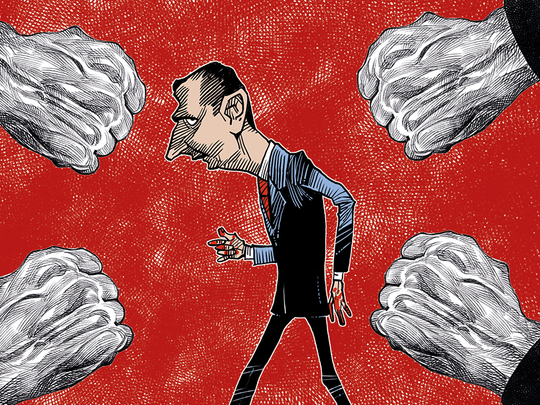
Last week more than 400 people were killed in the unimaginably awful siege of eastern Ghouta, most of them civilians. But in the seven years since the regime of Bashar Al Assad set in motion the Syrian civil war, almost 500,000 people have died — well over 1,000 a week. The truth is that brutality is winning in Syria because the democratic powers are afraid to confront it.
As for Al Assad’s allies, Iran and Russia, the latest deaths will certainly not make them reconsider their support for him. Russia had again blocked a UN Security Council resolution calling for a ceasefire in Syria before it later relented and the truce resolution was passed late on Saturday. Since the war began in 2011, Russia has vetoed 11 draft resolutions. Last week, it did not even need to veto, only to make clear that it would if the sponsors pushed their draft to a vote.
As a permanent member of the security council, Russia has a special responsibility for maintaining international peace and security. Instead, in New York it has protected Al Assad against the consequences of his actions, including the use of chemical weapons; inside Syria, its forces have actively participated in attacks on hospitals and other prima facie war crimes. These atrocities have been well-documented.
The response of western countries to the horrors in Syria is always the same: more statements deploring and condemning what has happened and appeals for an end to the violence. In the first two years of the conflict, the EU averaged almost one statement a week. The statements have become less frequent but no more effective. As the UN high commissioner for human rights, Zeid Ra’ad Al Hussain, said recently: “The conduct and management of this war has been utterly shameful from the outset and the failure to end it marks an epic failure of global diplomacy.”
After seven years, it would be easy to conclude that there is nothing we can do, or that — in the words of Yes, Prime Minister’s Sir Humphrey Appleby — “maybe there was something we could have done, but it’s too late now”. Western countries could simply accept that the slaughter will go on until the vastly superior forces of Syria, Iran and Russia have wiped out or driven away all their enemies. But doing nothing in the face of massacres would not absolve the West of a share of responsibility for the bloodshed, any more than it did in Rwanda or Bosnia.
Risk of destabilisation
Western leaders must also think about the impact on their own interests if the Syrian regime and its allies achieve victory and the only “political solution” in Syria is the reimposition of Al Assad’s autocratic rule throughout the country. Syria is not hermetically sealed from its neighbours or from Europe. There are already 5.5 million refugees outside Syria’s borders and more than 6 million internally displaced. Despite the aid the EU, the UK and other donors have given to support them, they will not be grateful to countries that would not tackle the source of their suffering. They will be ripe for exploitation by extremists and the countries that host the largest numbers — Jordan, Lebanon and Turkey — will be at risk of destabilisation.
At a minimum, the West should do more to end the impunity of Syria’s leaders and their allies. The UN General Assembly passed a resolution in December 2016 setting up a panel to assist in investigating and prosecuting those responsible for war crimes in Syria. Countries such as the UK that have laws allowing prosecutions for war crimes committed in other countries should work with the panel to open cases as soon as possible.
If there is evidence to implicate Iranian or Russian forces in serious violations of international humanitarian law, then they also should be targeted for prosecution. Those most responsible for the suffering of the Syrian people over the last seven years should spend the rest of their lives looking over their shoulders.
In addition, the EU and like-minded countries should step up sanctions against Russian individuals and companies involved in supporting the conflict in Syria.
Many may already be sanctioned in connection with Russia’s 2014 invasion of Ukraine, but the EU should increase the pressure with asset freezes, travel bans and restrictions on EU firms doing business with Russian entities active in Syria.
After failed interventions in Afghanistan, Iraq and Libya, western politicians understandably do not want to talk to their voters about military action in Syria. Russia’s involvement is an added complication: no one wants to stumble into world war three, especially when many of those still fighting are the kind of violent extremists that western governments are combating at home. But when politicians say that there is no military solution in Syria, they are lying: there is a military solution and Al Assad, Khamenei and Putin are imposing it. The West can either try to stop them or wait until peace comes to Syria when Al Assad and Putin run out of people to kill.
— Guardian News & Media Ltd
Ian Bond is the director of foreign policy at the Centre for European Reform.








